"Cherishing Little Steps - A Haven for Baby and Family Journeys"
The Importance of Physical Activity for Young Learners
Did you know that physical activity can greatly impact the cognitive abilities of young learners? Engaging in regular physical exercise not only benefits their physical health but also plays an important role in their overall academic performance and social development.
From improved concentration and enhanced brain function to building essential motor skills and reducing stress levels, the benefits of physical activity for young learners are vast and profound.
Explore into the world of how movement positively influences the holistic growth of children – it's a journey worth exploring.
Key Takeaways
- Physical activity boosts cognitive function and academic performance in young learners.
- It enhances social skills, teamwork, and communication abilities.
- Develops motor skills, coordination, and builds confidence.
- Promotes overall well-being, healthy habits, and physical development in young learners.
Physical Activity Enhances Brain Function
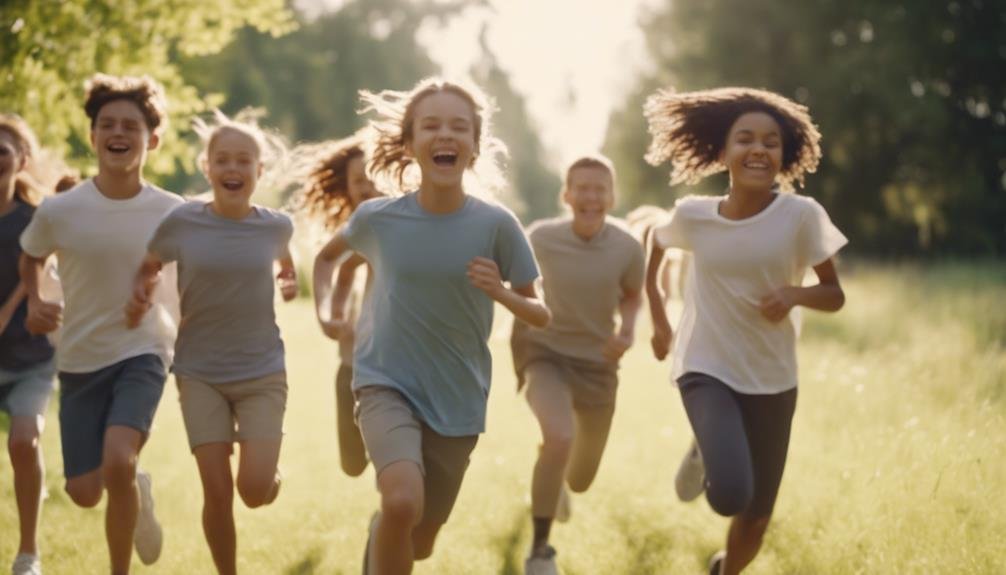
Engage in regular physical activity to boost your brain function and cognitive abilities. When you prioritize physical fitness, you not only strengthen your body but also enhance your cognition.
Studies have shown that improved cognition is directly linked to engaging in activities that get your heart pumping and your muscles working.
By incorporating regular exercise into your routine, you aren't only investing in your physical health but also sharpening your mental acuity. Physical activity increases blood flow to the brain, delivering essential nutrients and oxygen that are crucial for peak brain function.
This boost in circulation can enhance your memory, decision-making skills, and overall cognitive performance.
Improves Concentration and Focus
Shifting from boosting brain function, engaging in regular physical activity not only enhances cognition but also improves concentration and focus. When you make physical activity a part of your routine, you're setting yourself up for improved focus and better attention span in all areas of your life.
Here are three key ways in which physical activity enhances your concentration and focus:
- Enhanced Mental Clarity: Engaging in physical activity helps clear your mind, allowing you to focus more effectively on the tasks at hand.
- Reduced Stress Levels: Physical activity is a great way to reduce stress, which can often be a significant barrier to maintaining focus.
- Improved Task Management: Regular physical activity can help you develop better organizational skills, enabling you to manage your tasks more efficiently.
Boosts Academic Performance
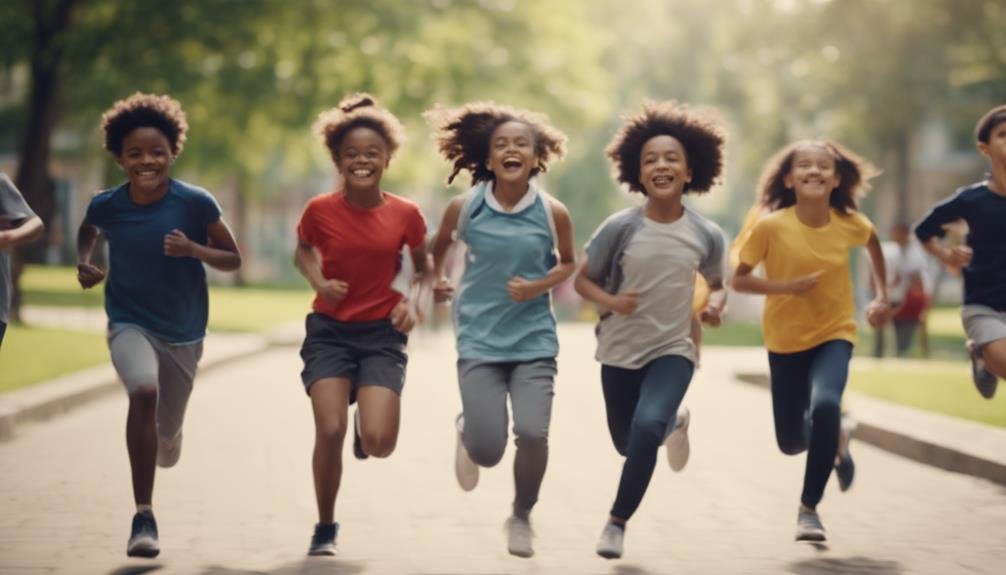
Regular physical activity significantly enhances academic performance by improving cognitive function and boosting overall brain health. Engaging in physical activities such as running, playing sports, or even dancing can have significant cognitive benefits for young learners. Studies have shown that exercise stimulates the release of chemicals in the brain that help improve memory retention, focus, and problem-solving skills. By incorporating regular physical activity into your routine, you're setting yourself up for academic success.
When you prioritize physical activity, you aren't only taking care of your body but also your mind. A healthy body leads to a healthy mind, and a healthy mind is vital for cognitive function. Physical activity increases blood flow to the brain, providing it with the oxygen and nutrients it needs to function at its best. This, in turn, can enhance your ability to concentrate in class, grasp new concepts quickly, and perform better on exams.
Fosters Social Skills and Teamwork
By participating in physical activities that promote teamwork and social interaction, young learners can develop essential social skills that are important for their personal growth and success. Engaging in group activities not only keeps you active but also nurtures important abilities that go beyond the playground.
- Communication Skills: Through teamwork, you learn how to express your thoughts effectively and listen to others, enhancing your verbal and non-verbal communication skills.
- Problem Solving: Working with peers to achieve a common goal teaches you how to identify issues, brainstorm solutions, and make decisions collaboratively.
These experiences lay the foundation for successful interactions in various aspects of life, from school projects to future careers. Building friendships and practicing cooperation during physical activities fosters a sense of belonging and strengthens your ability to work harmoniously with others.
Develops Gross and Fine Motor Skills
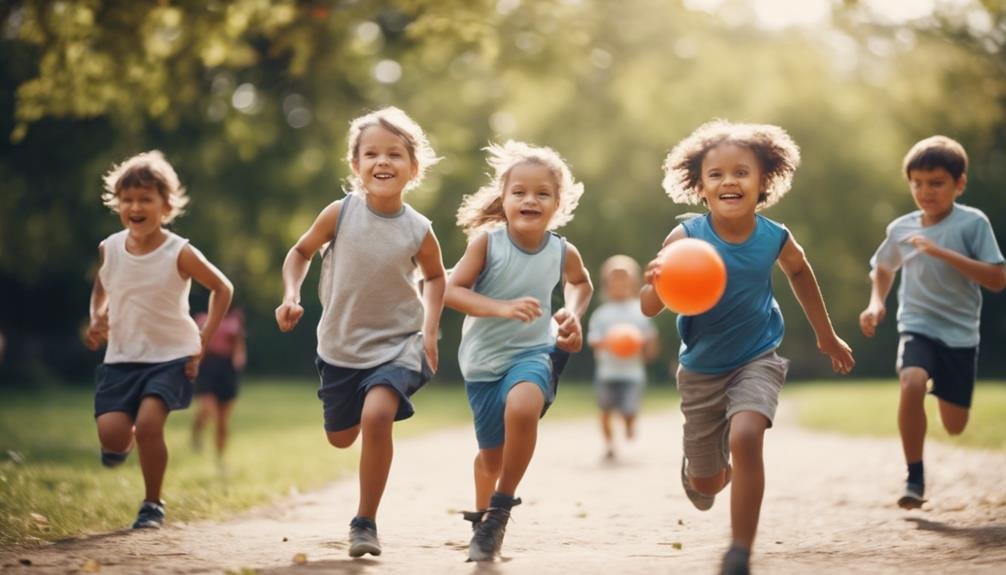
Engaging in physical activities that promote teamwork and social interaction not only fosters social skills but also plays a significant role in developing both gross and fine motor skills for young learners. By participating in coordination challenges like balancing games or obstacle courses, children refine their ability to control their body movements with precision. These activities not only make learning fun but also improve hand-eye coordination and spatial awareness.
Additionally, engaging in strength-building activities such as climbing walls or playing tug-of-war helps young learners develop their gross motor skills by enhancing muscle strength and coordination. These activities challenge their bodies in a safe and enjoyable environment, promoting overall physical development.
Encouraging children to participate in a variety of physical activities that focus on both gross and fine motor skills is essential for their holistic growth. Through active play, they not only enhance their physical abilities but also boost their confidence and self-esteem. So, get moving, have fun, and watch as your motor skills reach new heights!
Promotes Healthy Growth and Development
How can physical activity benefit the healthy growth and development of young learners? Engaging in regular physical activity plays a vital role in promoting the overall well-being of children. Here are three key ways in which physical activity fosters healthy growth and development:
- Supports Nutritional Diet: Physical activity not only helps burn off excess energy but also encourages children to develop healthy eating habits. When paired with a balanced diet, physical activity contributes to the proper growth and development of young learners.
- Encourages Outdoor Play: Getting children outdoors to engage in physical activity exposes them to fresh air, sunlight, and nature. Outdoor play not only promotes physical health but also enhances mental well-being and social skills in young learners.
- Boosts Cognitive Development: Physical activity has been linked to improved cognitive function, memory retention, and academic performance in children. By incorporating regular exercise into their routine, young learners can experience better focus, creativity, and overall brain development.
Encouraging physical activity, along with a nutritious diet and outdoor play, is key to supporting the healthy growth and development of young learners.
Reduces Stress and Anxiety Levels
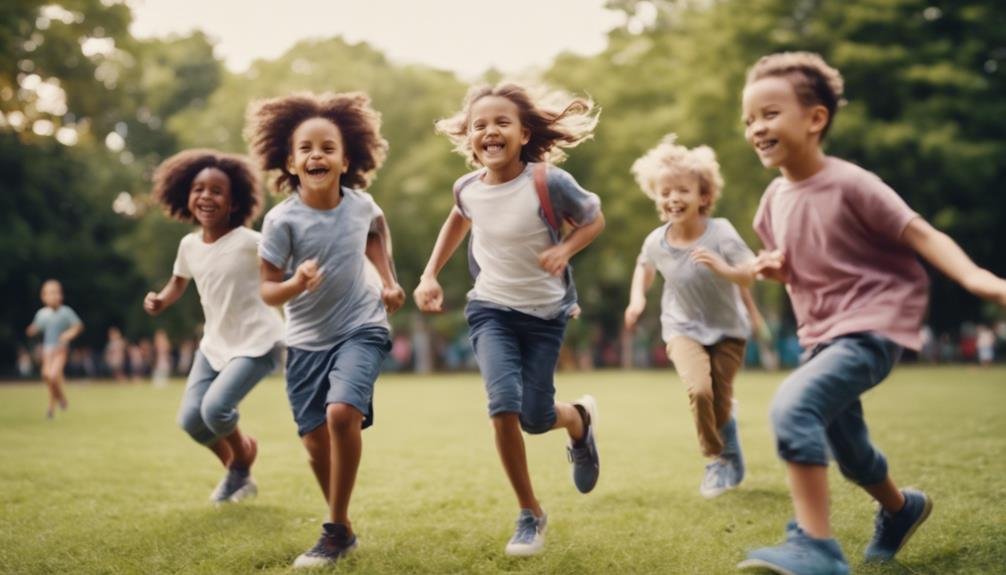
To further enhance the well-being of young learners, exploring how physical activity can reduce stress and anxiety levels is essential. Engaging in physical activity fosters a strong mind-body connection, allowing young learners to tune into their emotions and physical sensations.
When you move your body, whether through play, sports, or exercise, endorphins are released, acting as natural mood lifters and stress relievers. These endorphins help regulate your mood, reduce feelings of anxiety, and promote emotional well-being.
Physical activity serves as a powerful tool for managing stress and anxiety levels. It provides a healthy outlet for pent-up emotions and allows you to release tension both mentally and physically. By incorporating regular physical activity into your routine, you can cultivate resilience to stressors and enhance your overall well-being.
Enhances Sleep Quality
Regular physical activity contributes substantially to improving the quality of your sleep, allowing you to rest more deeply and wake up feeling refreshed and rejuvenated. Engaging in physical activities can positively impact your sleep patterns, leading to a more restful night's sleep.
Here are three ways in which physical activity enhances your sleep quality:
- Regulates Sleep-Wake Cycle: Exercise helps regulate your body's internal clock, making it easier for you to fall asleep at night and wake up feeling more alert in the morning.
- Reduces Insomnia Risk: Regular physical activity can decrease the chances of developing insomnia, ensuring you get the necessary amount of sleep each night.
- Enhances Cognitive Function: Quality sleep resulting from physical activity improves cognitive function, helping you stay focused and alert throughout the day.
Builds Self-Confidence and Self-Esteem
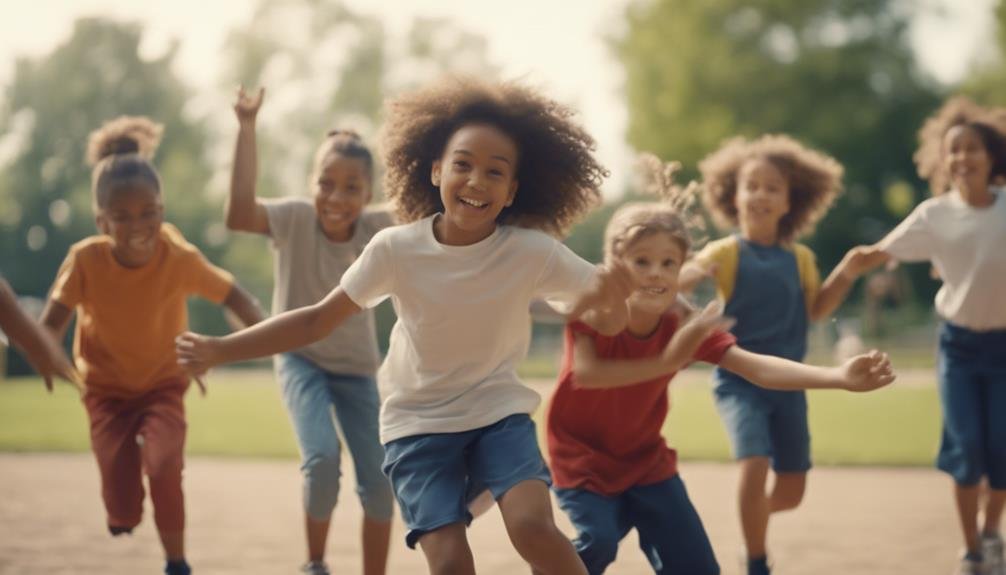
Improving your physical activity not only enhances your sleep quality but also plays a significant role in building your self-confidence and self-esteem. Engaging in physical activities helps you develop a strong sense of self-expression and body awareness. When you move your body, whether through dance, sports, or simply playing outdoors, you're expressing yourself in a unique way that boosts your self-confidence. This self-expression allows you to communicate without words, showcasing your abilities and creativity.
Furthermore, as you engage in physical activities, you become more attuned to your body. You start to understand its capabilities, strengths, and areas for improvement. This heightened body awareness fosters a positive self-image and self-esteem. You learn to appreciate your body for all that it can do rather than focusing on unrealistic standards set by society.
Instills Lifelong Healthy Habits
By incorporating physical activity into your daily routine, you pave the way for instilling lifelong healthy habits that can positively impact your overall well-being. Engaging in regular physical activity sets the foundation for a healthy lifestyle by making fitness a natural part of your daily life.
Here are three compelling reasons why integrating physical activity into your routine leads to long-term benefits:
- Improved Physical Health: Regular exercise helps maintain a healthy weight, strengthens your muscles and bones, and reduces the risk of chronic diseases like heart conditions and diabetes.
- Enhanced Mental Well-being: Physical activity releases endorphins, the feel-good hormones, which can help reduce stress, anxiety, and symptoms of depression.
- Boosted Energy Levels: Being active increases your energy levels, making you feel more vibrant and alert throughout the day.
Frequently Asked Questions
How Can Physical Activity Specifically Benefit Children With Learning Disabilities or Special Needs?
For children with learning disabilities or special needs, physical activity can enhance sensory integration and develop motor skills. Inclusive programs and adaptive equipment provide opportunities for all to engage in play and movement, promoting overall well-being and growth.
Are There Any Specific Types of Physical Activities That Are Recommended for Young Learners to Improve Cognitive Functions?
To enhance cognitive function in young learners, try incorporating yoga for mindfulness and dance for movement. These activities can boost focus, memory, and creativity. Get ready to have fun while improving your brainpower!
How Can Parents and Teachers Incorporate Physical Activity Into a Child's Daily Routine, Especially if They Have a Busy Schedule?
Feeling jam-packed with schedules? Sneak in fun outdoor games or quick indoor exercises. Make family fitness a thing or spice up classroom movement. Little steps count; soon, these bursts of activity will be a routine joy.
Are There Any Studies or Research That Show a Correlation Between Physical Activity and Improved Behavior in Children?
Engaging in physical activity has shown to enhance behavior management in children. Studies indicate a positive correlation between exercise and improved behavior. Encouraging active habits not only benefits behavior but also boosts academic performance.
What Are Some Creative Ways to Make Physical Activity More Engaging and Enjoyable for Young Learners Who May Not Be Naturally Inclined Towards Sports or Exercise?
To engage young learners not into sports, try inventive games like scavenger hunts. Transform exercise into outdoor adventures, like nature walks or gardening. Make physical activity fun by blending creativity with movement, fostering a lifelong love for being active.
Conclusion
To sum up, physical activity is like a key that reveals a treasure chest of benefits for young learners. It not only enhances brain function and academic performance, but also promotes social skills, reduces stress, and builds self-confidence.
So, lace up those sneakers, grab a ball, and get moving! Your body and mind will thank you for it in more ways than you can imagine. Start this journey today and watch yourself shine like a star in the sky.


